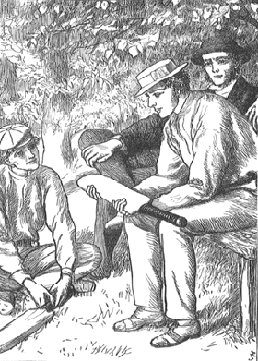out in the evening sun, bent on enjoying life, though he doesn’t quite know what to do with his arms and legs. Surely it is our friend the young Master, whom we have had glimpses of before, but his face has gained a great deal since we last came across him.
And by his side, in white flannel shirt and trousers, straw hat, the Captain’s belt, and the untanned yellow cricket shoes which all the eleven wear, sits a strapping figure, near six feet high, with ruddy tanned face and whiskers, curly brown hair and a laughing dancing eye. He is leaning forward with his elbows resting on his knees, and dandling his favourite bat, with which he has made thirty or forty runs to-day, in his strong brown hands. It is Tom Brown, grown into a young man nineteen years old, a præpostor and Captain of the eleven, spending his last day as a Rugby boy, and let us hope as much wiser as he is bigger, since we last had the pleasure of coming across him.
And at their feet on the warm dry ground, similarly dressed, sits Arthur, Turkish fashion, with his bat across his knees. He too is no longer a boy, less of a boy in fact than Tom, if one may judge from the thoughtfulness of his face, which is somewhat paler too than one could wish; but his figure, though slight, is well knit and active, and all his old timidity has disappeared, and is replaced by silent quaint fun, with which his face twinkles all over, as he listens to the broken talk between the other two, in which he joins every now and then.
All three are watching the game eagerly, and joining in the cheering which follows every good hit. It is pleasing to see the easy friendly footing which the pupils are on with their master, perfectly respectful, yet with no reserve and nothing forced in their intercourse. Tom has clearly abandoned the old theory of “natural enemies” in this case at any rate.
But it is time to listen to what they are saying, and see what we can gather out of it.
“I don’t object to your theory,” says the master, “and I allow you have made a fair case for yourself. But now, in such books as Aristophanes, for instance, you’ve been reading a play this half with the Doctor, haven’t you?”

The Conversation during the Match
“Yes, the Knights,” answered Tom.
“Well, I’m sure you would have enjoyed the wonderful humour of it twice as much if you had taken more pains with your scholarship.”
“Well, sir, I don’t believe any boy in the form enjoyed the sets-to between Cleon and the Sausage-seller more than I did—eh, Arthur?” said Tom, giving him a stir with his foot.
“Yes, I must say he did,” said Arthur. “I think, sir, you’ve hit upon the wrong book there.”
“Not a bit of it,” said the master. “Why, in those very passages of arms, how can you thoroughly appreciate them unless you are master of the weapons? and the weapons are the language, which you, Brown, have never half worked at; and so, as I say, you must have lost all the delicate shades of meaning which make the best part of the fun.”
“Oh! well played—bravo, Johnson!” shouted Arthur, dropping his bat and clapping furiously, and Tom joined in with a “bravo, Johnson!” which might have been heard at the chapel.
“Eh! what was it? I didn’t see,” inquired the master; “they only got one run, I thought?”
“No, but such a ball, three-quarters length and coming straight for his leg bail. Nothing but that turn of the wrist could have saved him, and he drew it away to leg for a safe one. Bravo, Johnson!”
“How well they are bowling, though,” said Arthur; “they don’t mean to be beat, I can see.”
| Previous chapter/page | Back | Home | Email this | Search | Discuss | Bookmark | Next chapter/page |